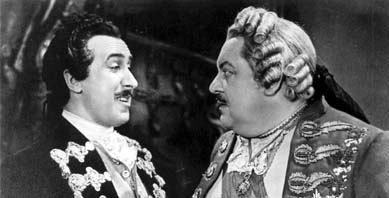Catalogue of Criteria for Banned National-Socialist Films
Even today certain Third Reich films cannot be shown publicly without special permission. Due to militaristic, racist, anti-Semitic, or nationalist content, their release is prevented by the film industry's institution of voluntary self-control [Freiwillige Selbstkontrolle or FSK]. The indicated films may only be shown "conditionally" in private screenings, accompanied by an historically competent introduction. The criteria determining which Nazi-period films would be "conditionally banned" were established directly after the war's end by the allied powers in the three western occupation zones. The allies had decided in June 1945 that all pre-1945 German films should be subjected to a thorough examination before their re-circulation would be permitted. On September 28, 1945, film officers representing the British, French, and Soviet military governments met to decide which films were to be prohibited from public exhibition in Germany.

The criteria they came up with was adopted, with minor changes, by the Allied Information Committee as the "Principles for Inter-Allied Censorship of German Films". Accordingly, the following types of films were to be prohibited:
- Films that glorify fascism, National-Socialism, or racial segregation.
- Films that promote a ideological redaction of German history.
- Films that glorify the German army. Films that contain negative representations of the Allies, particularly as regards their peoples, governments, and political and national leaders.
- Films with revisionist tendencies.
- Religious films that either offend or ridicule the religion or religious sensibility of other people or else celebrate the National-Socialist world view as a religion.
- Films that idealize the thought and deeds of German leaders containing an imperialist orientation harmful to others.
- Films based on the writings or any book by a prominent NSDAP party member or follower.
- Films that involved to a significant extent (as script writer, director, or lead actor) persons who are being prosecuted as active supporters of National-Socialism by the Allied Commission; or else, in such a case, they are not to be identified by name.
How these principles were to be interpreted was left up to the military governments for the respective zones. A 1952 list includes 221 films that met these criteria. The film industry's body for voluntary self-control, which with the founding of the Federal Republic continued the agenda of the Allies' film censorship, adopted these principles as the basis for determining conclusively which National-Socialist period films were to be censored.